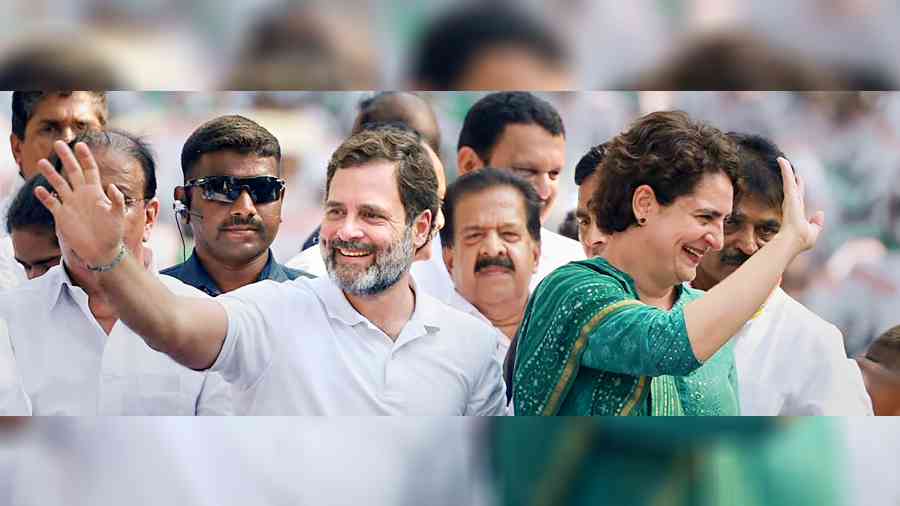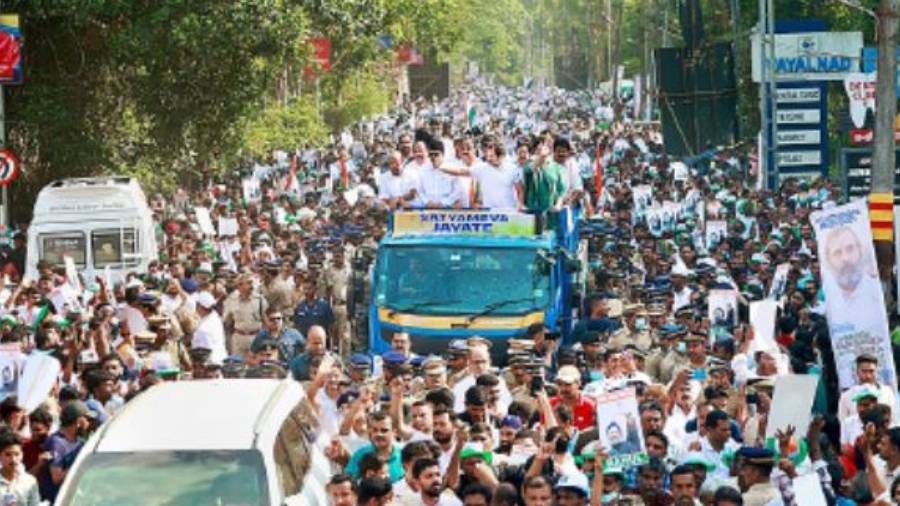Jomon hit the nail on the head. On April 10, during a chat in his three-wheeler on the road linking Mananthavady and Thrissilery in Wayanad, he said that nowadays candidates matter most in local body elections. The impact of choices made at that level is felt more immediately by the electorate than speeches in Parliament.
In 2019, Rahul Gandhi contested from Amethi and Wayanad. “The 2019 election in Wayanad was consumed by the excitement that we may be electing somebody very important for a future government,’’ a resident of Mananthavady recalled. On election day, polling in Wayanad exceeded 80 per cent. Rahul lost Amethi but won Wayanad by a margin of over 4,00,000 votes.
Fast forward to the present and Wayanad stands demoted from a constituency with a representative in Parliament to one without.
The Surat court conviction and Rahul’s subsequent disqualification from the Lok Sabha on its basis did come as a bolt from the blue. Protests broke out in Kalpetta, the district headquarters. They persisted for a couple of days but then died out. The aftertaste of demotion was one of prominence lost through the ouster of its high-profile representative in the Lok Sabha, but life went on as before.
Crucially, aside from ageneral notion that Rahul had been people-friendly, nobody I spoke to could recall preciselywhat work he did for Wayanad as its elected representative.
When contacted, the MP’s office on the outskirts of Kalpetta promptly sent media clippings of the work he had done, most significant of which appeared to be funds sanctioned for improving roads.
The office bearer of a local business association was clear that losing a high-profile MP would make no difference to Wayanad, if the yardstick used was addressing a region’s needs. After outlining his association’s wish list for Wayanad — it goes from seeking a railway line, an airstrip and improved road networks to tackling issues in agriculture and taking up tourism-related projects — he said, “What we require is a representative who understands the region and can be accessed easily.’’ Hence, the feeling in certain quarters that somebody local makes practical sense.
The people I spoke to didn’t give me the impression that Rahul succeeded at this sort of engagement. A periodic visitor to Wayanad, his newfound concerns were described as “emotional’’ and lacking enough realism to interest his constituency which faces issues related to livelihood and infrastructure. Discuss the point further and one suspects that what may have occurred is a disconnect. In a letter he sent to his constituents following disqualification, Rahul did not articulate the connection between the goals he hascommitted himself to and what he owes Wayanad.
“It’s hard to say if it’s him or those around him, but there’s a disconnect with Wayanad’s needs,’’ the man from the business forum said, even though he was clear that the hastily executed disqualification of the Wayanad MP was unjust.
Wayanad is landlocked and hilly. Its elevation ranges from a low of 354 feet to a maximum of 7,350 feet. Rich in foliage, a sizable portion of Wayanad is home to forests and wildlife. There is no airport or railway station. Roads connect Wayanad to the outside world. The mainstay of the local economy is agriculture (including plantations) and tourism. As part of the trijunction where Kerala, Tamil Nadu and Karnataka meet, a walk through any of Wayanad’s major towns will reveal more languages than Malayalam spoken. In terms of religion, there is diversity — Hinduism, Islam, Christianity and Jainism; followers of all reside here.
Farming is widespread. Some estimates have it that over 80 per cent of Wayanad’s people have a direct or indirect connection to agriculture. Although plantations exist, the most visible farming style is an intense intercropping rich in diversity. At Cheeral village, three farmers told this writer how their earnings had been affected by ever-increasing input costs, high labour costs, competition with farmers from Karnataka who work under a different farming reality, growing encounters between humans and wild animals, and inadequate compensation by the government for losses caused by wild animals. Land holdings inherited from ancestors have got subdivided through generations, rendering them small or medium farmers compared to the size of holdings, economies of scale and mechanisation seen in nearby states.
“Nobody cares about the problems of Wayanad’s farmers,” one from the trio said. Others cautioned that with the ascent of strident farmers’ groups focussed solely on their interests (this happened following studies that highlighted the environmental sensitivity of the Western Ghats), policymakers and the media must strive for a scientific overview, not an emotional one. According to them, there is even the issue of farmers being used as a convenient front by business interests.
Amid this, new generations from the families of hill farmersin Wayanad are staying away. This is due to both the state of agricul-ture and also the premium attached in Malayali society to being away from Kerala. “If you remain in Kerala, you are seen as a defective product,’’ a person into farming in Wayanad, joked.
At village Periya, a young man from a hill farming family who had, against the trend, given up a job in the city to return home to farm outlined his predicament. “Cost of production has gone up over the years. We have to either bring down the cost of production or improve earnings through value addition,” he said, adding, “Short-term measures by the state won’t work, only sustained support will.’’
According to Rajesh Krishnan, CEO of Thirunelly Agri Producer Company Limited, a much-studied enterprise in paddy cultivation in Wayanad, the chief problems in agriculture stem from the tendency of government and society to look at it as something to move away from rather than move towards.
On April 11, at a public meeting he addressed in Kalpetta along with his sister Priyanka, Rahul said that he was aware of Wayanad’s problems. He also tried explaining to Wayanad how his questions and actions in Parliament were linked to people’s lives. A good number of Congress supporters gathered and cheered the siblings on. Congress leaders who spoke highlighted the good work Rahul had done.
On the way to the meeting venue, near Kalpetta’s civil station, a banner thanked Rahul for his intervention in securing a UGC NET and NEET exam centre. Nobody I spoke to during my brief stay in Wayanad thought Rahul will lose if he contests again, for Wayanad is a United Democratic Front stronghold. Some felt the margin of his victory may be reduced because the novelty of 2019 no longer exists.
But as Jomon the auto driver pertinently said, we aren’t talking of a panchayat election.













